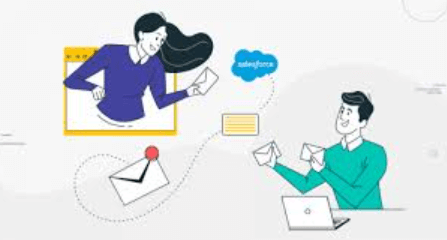Building Stronger Customer Relationships: Lessons Learned by a Marketing Cloud Email Specialist

Introduction:
In today’s competitive business landscape, building strong customer relationships is paramount to success. As organizations increasingly rely on digital channels to connect with their audience, marketers must adapt their strategies to foster meaningful connections and drive customer loyalty. In this article, we’ll explore valuable insights and lessons learned by a Marketing Cloud Email Specialist in cultivating stronger customer relationships. From understanding customer needs to delivering personalized experiences, we’ll uncover actionable strategies for building lasting connections with your audience.
Getting to Know Your Customers::
You’re at a massive party, filled with people from all walks of life. You’re eager to make new friends, but you know you can’t just dive in and start talking about yourself. Instead, you’d take the time to learn a bit about each person—what they enjoy, where they come from, and what makes them unique. Well, when it comes to building stronger relationships with your customers, the same principle applies!
One powerful way to understand your customers better is by creating what we call “buyer personas.” Think of these personas as characters in a story, each representing a different type of customer you might encounter. For instance, if you’re in the business of selling sports gear, you might have personas like “Active Annie,” who thrives on running marathons, and “Gamer Greg,” who’s all about video games and esports.
But crafting these personas is just the beginning. To truly get to know your customers, as a Marketing Cloud Email Specialist, you’ll need to do some detective work. Dive into data from your website, social media platforms, and customer surveys to gather insights into their demographics, interests, and pain points. The more you know, the better you can tailor your marketing efforts to resonate with them.
Now, here’s where the magic happens. Armed with all this knowledge, you can start crafting personalized marketing strategies that speak directly to your customers’ interests and needs. Let’s say you discover that a significant portion of your audience is passionate about yoga. You could launch a targeted email campaign showcasing your latest yoga gear, or perhaps organize a virtual yoga session exclusively for them! By demonstrating your understanding and catering to their preferences, you’ll forge deeper connections with your customers and earn their loyalty for the long haul.
Personalizing Communication:
Remember the last time you received a special birthday card or stumbled upon an ad for something you’ve been eyeing for ages? It probably felt like a personalized gift tailored just for you, right? Well, that’s the magic of personalized communication!
Imagine you’re scrolling through an online store, debating whether to splurge on those flashy red sneakers you’ve been drooling over. Suddenly, you receive an email from the store, featuring a snapshot of those exact sneakers and a sweet discount code—just for you! It’s almost as if they’re reading your mind!
This personalized approach isn’t sorcery; it’s savvy marketing fueled by data! Behind the scenes, marketers analyze your shopping patterns, preferences, and interests to craft messages that resonate with you on a personal level.
Let’s say you’re a loyal subscriber to a trendy clothing store’s email list. Using insights from your past purchases, they might send you tailored recommendations for outfits that match your style. Or perhaps you’ve been browsing their website for cozy winter coats; in that case, they might surprise you with an email featuring an exclusive deal on outerwear!
But it’s not just emails that get the personal touch. Ever noticed how the ads on your social media feed seem eerily relevant to your interests? That’s because companies use data to curate ads that align with your online behavior.
By infusing their communication with personal touches, marketers forge deeper connections with their customers, making them feel valued and understood. And when customers feel like more than just faceless consumers, they’re more likely to stick around and become loyal advocates for the brand!
Providing Exceptional Customer Service:
Picture this: You’ve just bought a new gadget online, but when you open the box, it’s not working properly. Or maybe your favorite sweater arrived with a pesky hole in it. What’s your next move? You’re likely to reach out to the company for help, right? That’s where exceptional customer service steps in!
Imagine you ordered a special birthday gift for your friend online, but the package never arrived, and her big day is just around the corner! You shoot off an email to the company explaining the situation. And guess what? They respond lightning-fast, apologizing for the mishap. Not only do they promise to send a replacement pronto, but they also toss in a generous discount code to make up for the inconvenience. Now, that’s what we call stellar service!
This is just one instance of exceptional customer service in action. It’s all about being swift to lend a hand when customers run into trouble, whether it’s via email, phone, or even social media. But it’s not just about fixing problems—it’s about doing it with a friendly attitude! When companies show genuine concern for their customers and their needs, it lays the foundation for trust and loyalty.
Another crucial aspect of exceptional service is being easy to reach. Imagine trying to call a company about an issue, but their contact info is nowhere to be found on their website. Talk about frustrating! Companies that make it simple for customers to reach out—whether through phone, email, or live chat—demonstrate that they value their customers’ time and are ready to assist whenever needed.
Whether it’s troubleshooting tech glitches, addressing queries, or simply being there to listen, exceptional customer service is the secret sauce for nurturing stronger bonds with customers. And when customers know they can rely on you to have their backs, they’ll keep coming back for more!
Creating Value Beyond Transactions:
Imagine you’re scrolling through an online store, looking for a new video game, when you stumble upon something unexpected—a blog full of gaming tips and tricks, all from the same website! Pretty cool, right? Well, that’s just one-way companies can create value beyond simple transactions.
When you buy something, you’re not just getting the product itself. You’re also getting the whole package—the experience, the extras, and maybe even a little something special. Take, for example, your favorite clothing brand. Sure, they sell awesome clothes, but they also throw cool events and workshops for their customers. It’s like buying a shirt and getting a side of fun!
But it doesn’t stop there. Some companies go even further by building communities around their products. Imagine you’re a photography buff, and you stumble upon a camera company that doesn’t just sell cameras. They also have online forums and social media groups where you can chat with other photography lovers. It’s like joining a club where everyone speaks your language!
And let’s not forget about companies that give back. Picture this: You’re eyeing a pair of shoes, and you find out that for every pair sold, the company donates one to someone in need. So not only do you get snazzy kicks, but you also get that warm, fuzzy feeling of making a difference.
By offering these extra perks and doing good in the world, companies show they’re about more than just making a buck—they’re about making connections and leaving a positive impact. And when customers feel like they’re part of something bigger, they’re more likely to stick around for the long haul!
Read also: 10 Creative Ways to Improve Employee Engagement and Boost Morale
Rewarding Customer Loyalty:
You’re a regular at your favorite coffee shop, and every time you buy a cup of coffee, they give you a stamp on a card. After you collect a certain number of stamps, you get a free coffee! That’s just one example of how companies reward customer loyalty.
Loyalty programs are like special clubs for customers who keep coming back. They might offer perks like discounts, freebies, or even exclusive access to events or products. For example, some stores have VIP programs where loyal customers get early access to sales or special birthday gifts. It’s like being part of a secret club where you get extra goodies just for being a loyal customer!
But loyalty isn’t just about getting free stuff—it’s also about feeling appreciated. Imagine you’ve been shopping at the same store for years, and one day, you get a handwritten thank-you note in the mail from the store owner, along with a coupon for your next purchase. How awesome would that feel?
And let’s not forget about personalized rewards. Imagine you’re shopping online, and the website sends you a special offer for a product you’ve been eyeing for a while. It’s like they know exactly what you want! Personalized rewards make customers feel seen and valued, which strengthens their connection to the brand.
By recognizing and rewarding customer loyalty, companies show that they care about their customers and appreciate their ongoing support. And when customers feel valued, they’re more likely to keep coming back and telling their friends about the amazing experiences they’ve had.
Continuous Improvement and Feedback:
Have you ever been asked to fill out a survey after shopping online or dining at a restaurant? That’s because companies want to hear what you think! Feedback from customers is like a roadmap for businesses—it helps them know what they’re doing well and where they can improve.
Imagine you buy a pair of shoes online, and when they arrive, they’re not quite the right size. You reach out to the company’s customer service, and they respond right away, offering to exchange the shoes for the correct size. After the exchange, they send you a short survey asking about your experience. Your feedback helps them know how to make the process even better for the next customer.
Surveys are just one-way companies gather feedback. They might also ask for reviews on their website or social media pages. Have you ever seen a restaurant with a comment box near the exit? That’s another way customers can share their thoughts!
But it’s not just about asking for feedback—it’s also about listening to what customers have to say. Let’s say you leave a review for a book you bought online, and a few days later, you get an email from the company’s CEO thanking you for your feedback and letting you know they’re working to address the issue you mentioned. That kind of response shows that they’re really listening to their customers and taking their feedback seriously.
By continuously seeking feedback and listening to their customers, businesses can make improvements that keep customers happy and coming back for more. It’s like having a direct line of communication between customers and the companies they love!
Conclusion:
In conclusion, building stronger customer relationships requires a strategic approach and a commitment to delivering exceptional experiences. By understanding customer needs, personalizing communication, providing outstanding service, creating value, rewarding loyalty, and embracing continuous improvement, marketers can cultivate lasting connections with their audience. By implementing these lessons learned by a Marketing Cloud Email Specialist, organizations can drive customer loyalty, increase retention, and ultimately, achieve long-term success in today’s competitive marketplace.




